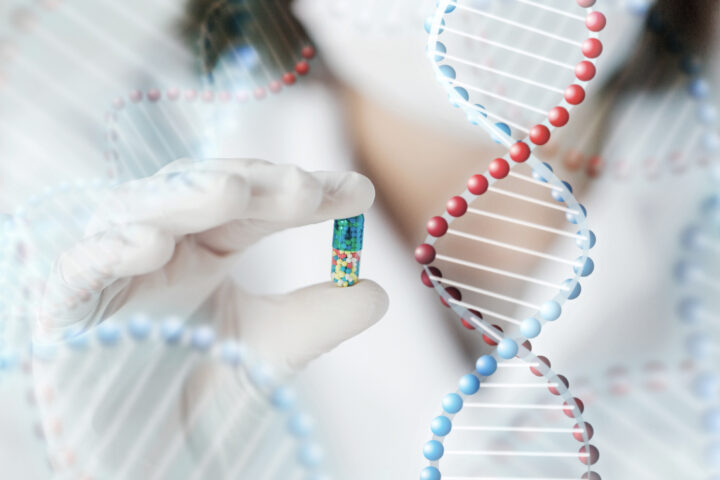In the quest for improved health and longevity, scientists have been digging deeper into our cellular makeup, uncovering the building blocks that could be the key to a longer, healthier life. One of the most promising discoveries in recent years is the role of NAD+ (Nicotinamide Adenine Dinucleotide) and its precursors in our body’s overall health. A study published in Cell Metabolism shines a light on this topic, providing valuable insights into how boosting NAD+ levels can potentially improve various aspects of health and slow down the aging process.
Understanding NAD+
NAD+ is a crucial molecule found in every cell of our body, playing a vital role in energy production, DNA repair, and the regulation of our internal clocks, or circadian rhythms. As we age, the levels of NAD+ in our body decline, leading to a decrease in these essential cellular functions and, consequently, contributing to the aging process and the development of age-related diseases.
The Role of NAD+ Precursors
To combat the decline of NAD+ with age, researchers have been investigating NAD+ precursors — substances that our body can convert into NAD+. These precursors can be taken as supplements to increase NAD+ levels, potentially offering a simple yet effective way to boost our cellular health and longevity.
Main Findings of the Study
The research highlighted in Cell Metabolism presents compelling evidence on the benefits of increasing NAD+ levels through precursor supplementation. The study showed that supplementing with NAD+ precursors led to improved energy production, enhanced DNA repair, and better regulation of circadian rhythms. These effects, in turn, could contribute to increased lifespan and a reduction in the risk of developing chronic diseases associated with aging, such as cardiovascular diseases, neurodegenerative disorders, and certain types of cancer.
Implications of the Research
This study’s findings are groundbreaking, suggesting that something as simple as taking NAD+ precursor supplements could have profound effects on our health and lifespan. By boosting NAD+ levels, we could potentially slow down the aging process and improve our body’s resilience against age-related diseases. It’s a promising step forward in the field of longevity research, opening up new avenues for promoting health and well-being as we age.
Personal Experience
My personal experience with NAD+ precursors has been enlightening. The research primarily discusses physical health benefits of supplementing with NAD+ precursors but after incorporating them into my routine for several weeks, the most striking improvement was in my mental focus. Sure, I noticed a subtle improvement in my physical energy, but the surge in my cognitive capabilities was remarkable. In fact, there is emerging research suggesting it could benefit our brains too.
For years, particularly after graduate school, I knew my brain could only work so hard in a given work day before I needed a break. I could work until about half-way through the day and then suddenly all reading, writing, and critical thinking became a much harder task. After about a month of taking NAD+ precursors, around 400-500mg per day, my ability to maintain concentration throughout the workday significantly increased, transforming how I managed tasks and deadlines. This newfound mental clarity and endurance underscored an aspect of NAD+ precursors that goes beyond mere physical health benefits, tapping into the profound impact these supplements can have on our cognitive function and overall quality of life. Much to my partner’s chagrin, my enhanced mental energy has carried over into my weekends. I find myself waking up earlier and I’m able to stay engaged all day, whether it’s working on hobbies or reorganizing my home.
As always, it’s important to approach this with caution and consult with a healthcare provider before starting any new supplement, especially if you have underlying health conditions or are taking other medications.
Takeaway
Overall, the research on NAD+ and its precursors offers exciting possibilities for enhancing our health and extending our lifespan. While more studies are needed to fully understand the long-term effects and optimal dosages, the current evidence suggests that boosting our NAD+ levels through precursors could be a key strategy in our pursuit of a longer, healthier life. Embracing this new frontier in health and longevity could well be the next big step in our ongoing journey towards achieving optimal well-being.
References
- Elhassan YS, Kluckova K, Fletcher RS, et al. Nicotinamide Riboside Augments the Aged Human Skeletal Muscle NAD+ Metabolome and Induces Transcriptomic and Anti-inflammatory Signatures. Cell Rep. 2019;28(7):1717-1728.e6. doi:10.1016/j.celrep.2019.07.043
- Cantó C, Menzies KJ, Auwerx J. NAD(+) Metabolism and the Control of Energy Homeostasis: A Balancing Act between Mitochondria and the Nucleus. Cell Metab. 2015;22(1):31-53. doi:10.1016/j.cmet.2015.05.023
- Gong B, Pan Y, Vempati P, et al. Nicotinamide riboside restores cognition through an upregulation of proliferator-activated receptor-γ coactivator 1α regulated β-secretase 1 degradation and mitochondrial gene expression in Alzheimer’s mouse models. Neurobiol Aging. 2013;34(6):1581-1588. doi:10.1016/j.neurobiolaging.2012.12.005
- Johnson S, Imai SI. NAD + biosynthesis, aging, and disease. F1000Res. 2018;7:132. Published 2018 Feb 1. doi:10.12688/f1000research.12120.1
- Massudi H, Grant R, Braidy N, Guest J, Farnsworth B, Guillemin GJ. Age-associated changes in oxidative stress and NAD+ metabolism in human tissue. PLoS One. 2012;7(7):e42357. doi:10.1371/journal.pone.0042357
- Schöndorf DC, Ivanyuk D, Baden P, et al. The NAD+ Precursor Nicotinamide Riboside Rescues Mitochondrial Defects and Neuronal Loss in iPSC and Fly Models of Parkinson’s Disease. Cell Rep. 2018;23(10):2976-2988. doi:10.1016/j.celrep.2018.05.009
- Sweeney G, Song J. The association between PGC-1α and Alzheimer’s disease [published correction appears in Anat Cell Biol. 2016 Jun;49(2):163]. Anat Cell Biol. 2016;49(1):1-6. doi:10.5115/acb.2016.49.1.1
- Trammell SA, Schmidt MS, Weidemann BJ, et al. Nicotinamide riboside is uniquely and orally bioavailable in mice and humans. Nat Commun. 2016;7:12948. Published 2016 Oct 10. doi:10.1038/ncomms12948












